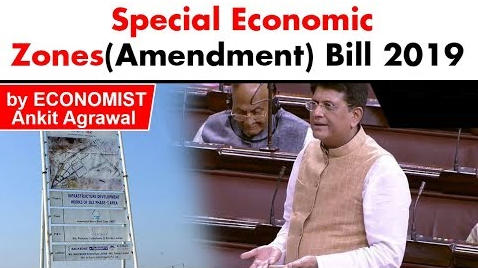Table of Contents

- It amends the Special Economic Zones Act, 2005 and replaces an Ordinance that was promulgated on March 2, 2019.
- The Ministry of Commerce and Industry administers two departments, the Department of Commerce and the Department for Promotion of Industry & Internal Trade (formerly Department of Industrial Policy & Promotion).

- India was one of the first in Asia to recognize the effectiveness of the Export Processing Zone (EPZ) model in promoting exports, with Asia’s first EPZ set up in Kandla in 1965.
- The Special Economic Zones (SEZs) Policy was announced in April 2000.
- The Special Economic Zones Act, 2005, was passed by Parliament in May, 2005.
SPECIAL ECONOMIC ZONES ACT, 2005
- The Act provides for the establishment, development and management of Special Economic Zones for the promotion of exports
The main objectives of the SEZ Act are:
- Generation of additional economic activity
- Promotion of exports of goods and services
- Promotion of investment from domestic and foreign sources.
- Creation of employment opportunities
- Development of infrastructure facilities..
What Is a Special Economic Zone (SEZ)?
- A special economic zone is an area in a country that is subject to unique economic regulations that differ from other regions of the same country.

SEZ PERFORMANCE
- Piyush Goyal told the House that the SEZs by the end of March 2019.
- Had generated 20 lakh jobs,
- Brought investments worth Rs 5 lakh crore,
- Exports worth Rs 7 lakh crore.
AMENDMENT IN THE SEZ ACT
- Under the original Act, the definition of a person includes an individual, a Hindu undivided family, a company, a co-operative society, a firm, or an association of persons.
- The Bill adds two more categories
- A trust, or
- Any other entity which may be notified by the central government.
THIS WILL RESULT IN
- All types of trusts to operate from the SEZs –
- Public charitable trusts,
- Private trusts run by big and small corporate houses,
- Business trusts like REITs and InvITs •
- Port trusts run by the government.
- These trusts run a wide range of activities ranging from health, education, skilling and other livelihood generation activities to manufacturing and financing.
WHAT IS A TRUST?
- A trust “is a fiduciary arrangement that allows a third party, or trustee, to hold assets on behalf of a beneficiary or beneficiaries.”
- For example
- Baba Ramdev’s Patanjali Yogpeeth, a trust which operates from Haridwar, can now operate from the Vishakhapatnam SEZ and export its products like ayurvedic medicines, cosmetics and food products with ease by using the port facility nearby.

WHY TRUST?
- Trusts are significant contributors to the financial sector.
- The government has received eight proposals from trusts to set up units in SEZs.
- The proposals, have investment potential of up to Rs 8,000 crore
- The proposed changes can result in about 3 billion dollars of new investments annually.
According to the Ministry of Commerce and Industry
- 40% (143) of the notified SEZs (373) are non-operational.
- More than 50% of land notified for the SEZ use is lying vacant.
- By allowing trusts to set up units in the SEZs, the unused land could be put to productive use now.

INDIA VS CHINA
- Chinese SEZ initiative is government driven whereas Indian SEZs are driven by private sector.
- China has exactly six SEZs :- Shenzhen, Zhuhai, Shantou, Xiamen, Hainan and Pudong.
Latest Burning Issues | Free PDF























 WhatsApp
WhatsApp